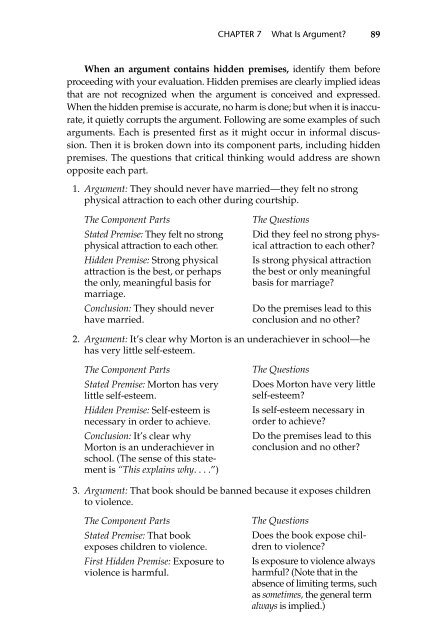Beyond Feelings
Beyond Feelings
Beyond Feelings
You also want an ePaper? Increase the reach of your titles
YUMPU automatically turns print PDFs into web optimized ePapers that Google loves.
CHAPTER 7 What Is Argument?<br />
When an argument contains hidden premises, identify them before<br />
proceeding with your evaluation. Hidden premises are clearly implied ideas<br />
that are not recognized when the argument is conceived and expressed.<br />
When the hidden premise is accurate, no harm is done; but when it is inaccurate,<br />
it quietly corrupts the argument. Following are some examples of such<br />
arguments. Each is presented first as it might occur in informal discussion.<br />
Then it is broken down into its component parts, including hidden<br />
premises. The questions that critical thinking would address are shown<br />
opposite each part.<br />
1. Argument: They should never have married—they felt no strong<br />
physical attraction to each other during courtship.<br />
The Component Parts<br />
Stated Premise: They felt no strong<br />
physical attraction to each other.<br />
Hidden Premise: Strong physical<br />
attraction is the best, or perhaps<br />
the only, meaningful basis for<br />
marriage.<br />
Conclusion: They should never<br />
have married.<br />
89<br />
The Questions<br />
Did they feel no strong physical<br />
attraction to each other?<br />
Is strong physical attraction<br />
the best or only meaningful<br />
basis for marriage?<br />
Do the premises lead to this<br />
conclusion and no other?<br />
2. Argument: It’s clear why Morton is an underachiever in school—he<br />
has very little self-esteem.<br />
The Component Parts<br />
Stated Premise: Morton has very<br />
little self-esteem.<br />
Hidden Premise: Self-esteem is<br />
necessary in order to achieve.<br />
Conclusion: It’s clear why<br />
Morton is an underachiever in<br />
school. (The sense of this statement<br />
is “This explains why. . . .”)<br />
The Questions<br />
Does Morton have very little<br />
self-esteem?<br />
Is self-esteem necessary in<br />
order to achieve?<br />
Do the premises lead to this<br />
conclusion and no other?<br />
3. Argument: That book should be banned because it exposes children<br />
to violence.<br />
The Component Parts<br />
Stated Premise: That book<br />
exposes children to violence.<br />
First Hidden Premise: Exposure to<br />
violence is harmful.<br />
The Questions<br />
Does the book expose children<br />
to violence?<br />
Is exposure to violence always<br />
harmful? (Note that in the<br />
absence of limiting terms, such<br />
as sometimes, the general term<br />
always is implied.)


